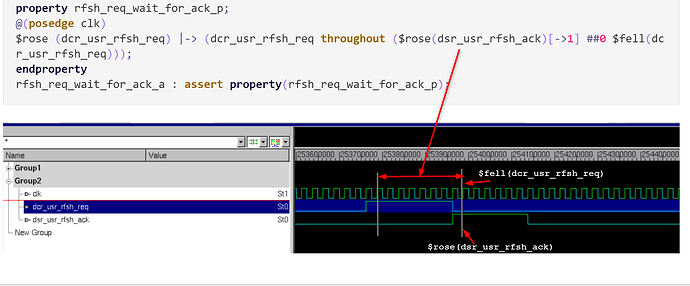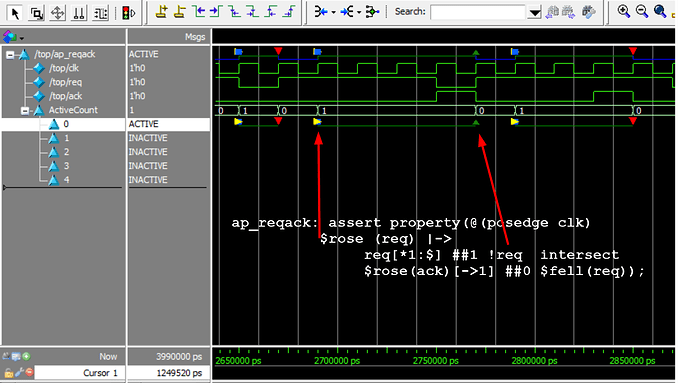I want to do assertion check to make sure req stays high until ack high as shown in the waveform below. I try to do it like this but the assertion fail even when the condition is met. Can someone please point out what’s wrong with my assertion code?
property rfsh_req_wait_for_ack_p;
@(posedge clk)
$rose (dcr_usr_rfsh_req) |-> (dcr_usr_rfsh_req throughout ($rose(dsr_usr_rfsh_ack)[->1] ##0 $fell(dcr_usr_rfsh_req)));
endproperty
rfsh_req_wait_for_ack_a : assert property(rfsh_req_wait_for_ack_p);
user49
February 11, 2021, 5:12am
2
In reply to lisa.lalice : #0 $fell(dcr_usr_rfsh_req)));
If you want anassertion to meet your waveform where dcr_usr_rfsh_req==0 when
$rose (dcr_usr_rfsh_req) |->
(dcr_usr_rfsh_req[*1:$] ##1 !dcr_usr_rfsh_req intersect
($rose(dsr_usr_rfsh_ack)[->1] ##0 $fell(dcr_usr_rfsh_req)));
Ben Cohenhttp://www.systemverilog.us/ ben@systemverilog.us http://cvcblr.com/home.html
SVA Package: Dynamic and range delays and repeats SVA: Package for dynamic and range delays and repeats - SystemVerilog - Verification Academy
Free books: Component Design by Example https://rb.gy/9tcbhl Amazon.com
Papers:
In reply to ben@SystemVerilog.us :
$rose(dsr_usr_rfsh_ack)[->1]
As there is a $rose, isn’t the above assertion successful only in the first clock when ack==1 ?
Should we change the above assertion to as follows:
$rose (dcr_usr_rfsh_req) |->
(dcr_usr_rfsh_req[*1:$] ##1 !dcr_usr_rfsh_req intersect
(dsr_usr_rfsh_ack[->1] ##0 $fell(dcr_usr_rfsh_req)));
user49
February 11, 2021, 4:07pm
4
In reply to yourcheers :
In reply to ben@SystemVerilog.us :
$rose (dcr_usr_rfsh_req) |->
(dcr_usr_rfsh_req[*1:$] ##1 !dcr_usr_rfsh_req intersect
(dsr_usr_rfsh_ack[->1] ##0 $fell(dcr_usr_rfsh_req))); // without the $rose
//vs
$rose (dcr_usr_rfsh_req) |->
(dcr_usr_rfsh_req[*1:$] ##1 !dcr_usr_rfsh_req intersect
($rose(dsr_usr_rfsh_ack)[->1] ##0 $fell(dcr_usr_rfsh_req))); // with the $rose
// COMMENTS
a |-> b[->1] // If b==1 in cycle a==1 the property is true
// If b==0 in cycle a==1, then b[->1] is equivalent to $rose(b)[->1]
// because when b==1 you do get a $rose(b).
a |-> $rose(b)[->1] // If b==1 in cycle a==1, then you have to wait till
// b==0 and then rises back to b==1
// Bottom line: Little difference if you know that b==0 when a==1
Ben SystemVerilog.us
In reply to ben@SystemVerilog.us :
Thanks ben, I was mistaken with the waveform where ack is not a pulse.
In reply to ben@SystemVerilog.us :
If you want anassertion to meet your waveform where dcr_usr_rfsh_req==0 when
$rose (dcr_usr_rfsh_req) |->
(dcr_usr_rfsh_req[*1:$] ##1 !dcr_usr_rfsh_req intersect
($rose(dsr_usr_rfsh_ack)[->1] ##0 $fell(dcr_usr_rfsh_req)));
Hi Ben, I’ve tried the assertion code you’d suggested me above but my assertion still fail
user49
February 13, 2021, 7:16am
7
In reply to lisa.lalice :
ap_reqack: assert property(@(posedge clk)
$rose (req) |->
req[*1:$] ##1 !req intersect
$rose(ack)[->1] ##0 $fell(req));
module top;
timeunit 1ns/10ps;
`include "uvm_macros.svh"
import uvm_pkg::*;
bit clk, req, ack;
initial forever #10 clk=!clk;
ap_reqack: assert property(@(posedge clk)
$rose (req) |->
req[*1:$] ##1 !req intersect
$rose(ack)[->1] ##0 $fell(req));
initial begin
repeat(200) begin
@(posedge clk);
if (!randomize(req, ack) with
{ req dist {1'b1:=5, 1'b0:=1};
ack dist {1'b1:=1, 1'b0:=5};
}) `uvm_error("MYERR", "This is a randomize error");
end
$finish;
end
endmodule
In reply to ben@SystemVerilog.us :
It seems like my assertion only works when I assert it straight away instead of using property/endproperty
This is what I did and it works
rfsh_req_holds_until_ack_a : assert property(@(posedge clk)
$rose (dcr_usr_rfsh_req) |-> dcr_usr_rfsh_req[*1:$] ##1 !dcr_usr_rfsh_req intersect $rose(dsr_usr_rfsh_ack)[->1] ##0 $fell(dcr_usr_rfsh_req));
This, on the other hand, the code that I did previously and it fails. It’s actually the same code I’m not sure why it fails
property rfsh_req_wait_for_ack_p;
@(posedge clk)
$rose (dcr_usr_rfsh_req) |->
(dcr_usr_rfsh_req[*1:$] ##1 !dcr_usr_rfsh_req intersect
($rose(dsr_usr_rfsh_ack)[->1] ##0 $fell(dcr_usr_rfsh_req)));
endproperty
rfsh_req_wait_for_ack_a : assert property(rfsh_req_wait_for_ack_p);
user49
February 15, 2021, 2:34am
9
In reply to lisa.lalice :
You need either a default clocking or a @(posedge clk) in either the property or in the assertion.
property rfsh_req_wait_for_ack_p;
@(posedge clk $rose (dcr_usr_rfsh_req) |->
(dcr_usr_rfsh_req[*1:$] ##1 !dcr_usr_rfsh_req intersect
($rose(dsr_usr_rfsh_ack)[->1] ##0 $fell(dcr_usr_rfsh_req)));
endproperty
rfsh_req_wait_for_ack_a : assert property(rfsh_req_wait_for_ack_p);
Ben systemverilog.us
In reply to ben@SystemVerilog.us :
Sorry Ben, that is a typo. I did add a default clocking in my assertion code and it still fail.
user49
February 15, 2021, 4:16am
11
In reply to lisa.lalice :
Is default clocking the same as @(posedge clk or a different clock.
In reply to ben@SystemVerilog.us :
I used the same clock
user49
February 15, 2021, 4:53pm
13
In reply to lisa.lalice : Edit code - EDA Playground
module top;
timeunit 1ns/10ps;
`include "uvm_macros.svh"
import uvm_pkg::*;
bit clk, req, ack;
initial forever #10 clk=!clk;
default clocking @(posedge clk);
endclocking
ap_reqack_direct: assert property(@(posedge clk)
$rose (req) |->
req[*1:$] ##1 !req intersect
$rose(ack)[->1] ##0 $fell(req));
property p_reqack_default_clk;
$rose (req) |->
req[*1:$] ##1 !req intersect
$rose(ack)[->1] ##0 $fell(req);
endproperty
ap_reqack_default_clk: assert property(p_reqack_default_clk);
property p_reqack_with_clk;
@(posedge clk) $rose (req) |->
req[*1:$] ##1 !req intersect
$rose(ack)[->1] ##0 $fell(req);
endproperty
ap_reqack_with_clk: assert property(p_reqack_with_clk);
property p_reqack_with_clk2;
$rose (req) |->
req[*1:$] ##1 !req intersect
$rose(ack)[->1] ##0 $fell(req);
endproperty
ap_reqack_with_clk2: assert property(@(posedge clk) p_reqack_with_clk2);
initial begin
repeat(200) begin
@(posedge clk);
if (!randomize(req, ack) with
{ req dist {1'b1:=5, 1'b0:=1};
ack dist {1'b1:=1, 1'b0:=5};
}) `uvm_error("MYERR", "This is a randomize error");
end
$finish;
end
endmodule
// Reesults
...
# ASSERT: Error: ASRT_0005 testbench.sv(10): Assertion "ap_reqack_direct" FAILED at time: 2,110ns (106 clk), scope: top, start-time: 2,090ns (105 clk)
# ASSERT: Error: ASRT_0005 testbench.sv(20): Assertion "ap_reqack_default_clk" FAILED at time: 2,110ns (106 clk), scope: top, start-time: 2,090ns (105 clk)
# ASSERT: Error: ASRT_0005 testbench.sv(27): Assertion "ap_reqack_with_clk" FAILED at time: 2,110ns (106 clk), scope: top, start-time: 2,090ns (105 clk)
# ASSERT: Error: ASRT_0005 testbench.sv(34): Assertion "ap_reqack_with_clk2" FAILED at time: 2,110ns (106 clk), scope: top, start-time: 2,090ns (105 clk)
# ASSERT: Error: ASRT_0005 testbench.sv(10): Assertion "ap_reqack_direct" FAILED at time: 2,150ns (108 clk), scope: top, start-time: 2,130ns (107 clk)
# ASSERT: Error: ASRT_0005 testbench.sv(20): Assertion "ap_reqack_default_clk" FAILED at time: 2,150ns (108 clk), scope: top, start-time: 2,130ns (107 clk)
# ASSERT: Error: ASRT_0005 testbench.sv(27): Assertion "ap_reqack_with_clk" FAILED at time: 2,150ns (108 clk), scope: top, start-time: 2,130ns (107 clk)
# ASSERT: Error: ASRT_0005 testbench.sv(34): Assertion "ap_reqack_with_clk2" FAILED at time: 2,150ns (108 clk), scope: top, start-time: 2,130ns (107 clk)



